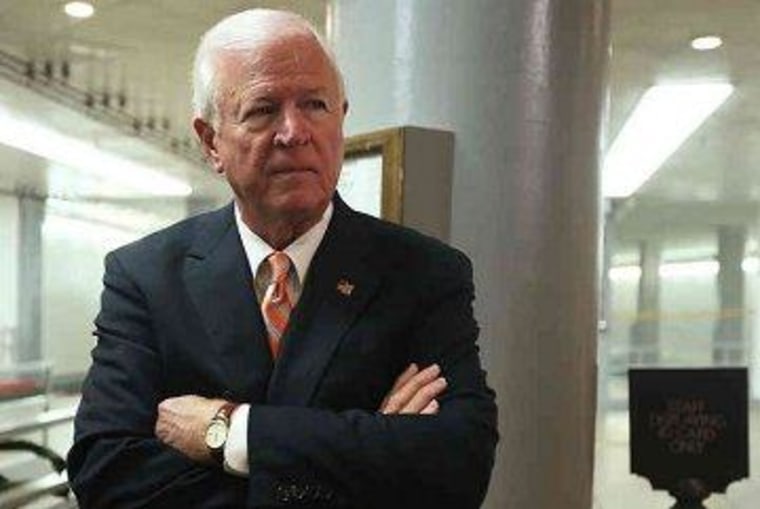The march towards marriage equality has taken some important steps forward recently, and with public attitudes quickly becoming more progressive, it's no longer a question of "if" the nation will do the right thing, but rather, "when."
Indeed, support for marriage equality is even becoming more bipartisan, slowly but surely, with Sen. Rob Portman (R-Ohio) joining a growing number of Republicans outside public office in support of same-sex marriage.
That said, progress among GOP officeholders remains terribly slow.
Support for gay marriage is picking up steam all over the country -- except on Capitol Hill.Take Sen. Saxby Chambliss. When asked if his views had changed on gay marriage, the Georgia Republican quipped: "I'm not gay. So I'm not going to marry one."
Well, with logic like that, it's obvious our elected leaders are poised for a mature, high-minded debate about civil rights.
I mean, really. Saxby Chambliss opposes marriage rights because he's "not gay"? Does he realize that same-sex marriage would not require him to leave his wife and marry a man? Do Americans really have to wait for elected officials to actually be gay before marriage equality is a national reality?
In some ways, Chambliss' response is a counterweight of sorts to Portman's response. In the latter case, the Ohio Republican came around after learning that his son is gay and wanting him to have equal rights. In the former, the Georgia Republican isn't personally gay, so he doesn't see the need to extend equal rights to anyone else.
Of course, by this reasoning, Chambliss would be comfortable with discrimination against anyone who isn't a wealthy, white, Christian guy from the South.
The disconnect between inside-and-outside-the-Beltway attitudes comes at a thorny time, especially for Republicans. The party is trying to broaden its appeal to younger Americans -- who support gay marriage in large numbers -- as well as scores of new voting blocs. Some establishment figures have changed course, with Rob Portman last week becoming the first sitting GOP senator to endorse gay marriage, after learning that his son is gay. And the Republican National Committee, in a bluntly worded report detailing the GOP's political woes, called for the party to become more sensitive on the issue of gay rights.But many lawmakers are changing their legislative tactics and toning down their public rhetoric -- rather than undergoing a sea change in their stances.
The piece quotes quite a few lawmakers who aren't willing to endorse marriage equality -- including alleged champions of civil liberties like Rand Paul -- but my personal favorite came from Sen. Lindsey Graham (R-S.C.): "I believe in traditional marriage -- between a man and a woman, without animosity. I don't mind if people are able to transfer their property, visit their loved ones in hospitals, but marriage to me, I've stayed with the concept of traditional marriage."
On a related note, this "disconnect between inside-and-outside-the-Beltway" seems to come up quite a bit, doesn't it? Most Americans want new measures to prevent gun violence, bills to create jobs and promote economic growth, marriage equality, higher taxes on the wealthy, and fiscal compromises, but many of the officials voters elected to shape federal policy don't seem inclined to take public attitudes to heart .
Perhaps they're too invested in looking at the world through a Chamblss-like lens.
Update: Adam Serwer compared Chambliss' answer to former Sen. Jon Kyl's (R-Ariz.) famous declaration that he doesn't need maternity care, so requiring maternity care in insurance plans isn't important.
